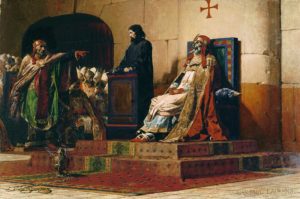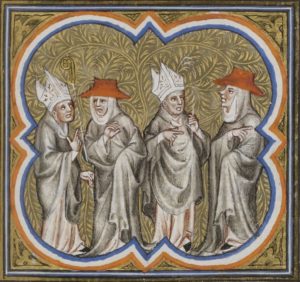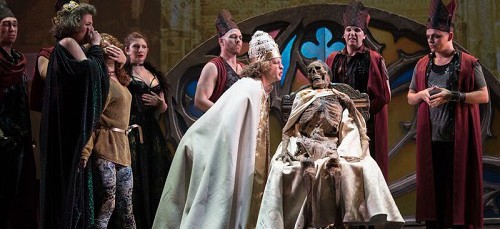It is hard to deny that the United States is experiencing a time of political upheaval unlike anything we have known in our lifetimes: two men laying claim to the presidency, an insurrection at the Capitol, a history-making second impeachment, and an unprecedented upcoming Senate trial of a former president. It’s enough to make Uncle Sam’s head spin.
If you think, however, that politics are crazy in the United States right now, check out church history.
One of the weirdest, most gruesome stories from the Christian tradition hails from the ninth century when Pope Stephen VI placed a previous pope, Pope Formosus, on trial. Stephen VI accused Formosus of perjury as well as ascending to the papacy illegally.
But there was one problem: Pope Formosus was dead — nine months buried, decomposing dead. This detail did not deter Pope Stephen. He exhumed the corpse of Pope Formosus, placed papal vestments on the rotting cadaver, perched him on a throne, and conducted a trial. An unlucky deacon spoke on behalf of Formosus because, in the words of writer Amelia Soth, “While Stephen VI hurled accusations at Formosus, the accused remained stoically silent, as might be expected of a corpse.”

“Cadaver Synod, Pope Formosus and Stephen VI,” 1870, by Jean-Paul Laurens.
Pope Stephen found Pope Formosus guilty (any surprise there?), stripped Formosus of his papal vestments, and mutilated his dead body, cutting off the three fingers used for consecration and rendering his acts as pope null and void. Eventually, Formosus’ corpse was thrown into the Tiber River, where it remained until an unsuspecting fisherman discovered it.
By then, Pope Stephen VI had been usurped, imprisoned and assassinated by strangulation in his prison cell. Theodore II became the new pope. Theodore reinstated Formosus and gave him a proper burial in St. Peter’s Basilica.
This strange event became known as the “Cadaver Synod.” It set off a tumultuous period of violence and corruption among rival groups within the church, each jockeying for control of the papacy. Popes executed their challengers or annulled their work. Eventually Pope John IX put a stop to the madness, forbidding the trial of a dead pope, or for that matter, all corpses.
Fast forward half a millennium and the church found itself in another period of upheaval. In the 14th century, political tensions grew between church leaders and people of Italy and between church leaders and people of France. In 1378, two men found themselves elected to the papacy simultaneously: Clement VII from France and Urban VI from Italy.

The Western Schism depicted in art.
Bibliothèque nationale de France
The battle for the papacy continued even after the deaths of both Urban VI and Clement VII, and subsequent popes maintained the dueling courts. A council of cardinals met in Pisa in 1409 in an attempt to settle the dispute by deposing both popes as heretics. They sought to install a third man, Alexander V, as the new “unity” pope. Their efforts failed, resulting in three men vying for the Chair of Peter.
In the words of author and historian Phyllis Tickle, “While having three warring popes all claiming to be the one, true pope may seem somewhere between quaint and downright ludicrous to us now, it did not seem so to the church and citizenry of the early 15th century.” Tickle wrote that line in 2008. It may not seem so ludicrous now, more than a decade later.
As the United Stated prepares to endure yet another impeachment trial, this time of a former president, citizens may wonder how or when our divisions will resolve. Will there be more violence? Will those who defiled the Capitol on Jan. 6 accept the presidency of Joe Biden, or will they continue to say and believe the election was stolen from Donald Trump? Was Jan. 6 the end of the fight, or just the beginning? Can democracy endure this challenge?
These are unsettling times. Maybe like me, you worry about our country and what kind of church and world our children and grandchildren will inherit. It helps me to remember that upheaval is not unique to our generation. Church history proves that.
When we look to the past — discovering that popes rise and popes fall — we can gain perspective in remembering that division and conflict are nothing new. Presidents rise; presidents fall. One system of governance gives way to another. It is natural to feel anxious and troubled through times of great upheaval. But take heart in this: at least we aren’t trying a corpse for high crimes and misdemeanors.
Rhonda Abbott Blevins serves as senior pastor of Chapel by the Sea in Clearwater Beach, Fla., and an associate with Pinnacle Leadership Associates. She earned the doctor of ministry degree from Mercer University’s McAfee School of Theology and previously served as the coordinator of CBF Kentucky. She and her husband, Terry, live with their two sons in Palm Harbor, Fla.

